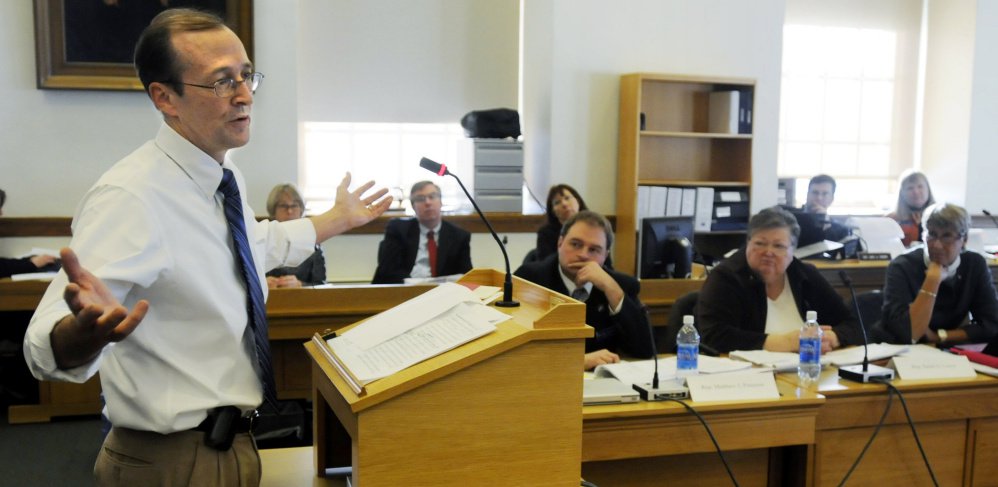For much of his medical career, Erik Steele didn’t think he and his fellow doctors should help terminally ill patients get the medicine that could kill them.
“When you make these decisions, you will make mistakes, whether it’s capital punishment or physician-assisted suicide,” he said, recalling his old views on the subject. “If you take 1,000 patients, there will potentially be a few where you will make mistakes. And if you make mistakes, you should make them on the side of life.”
But around 2010, two things happened that forced Steele, a family doctor who has worked all over Maine, to reconsider his views. One of his patients, a terminally ill man named David, died after shooting himself in the chest. And after physician assisted-suicide was legalized in Oregon and Washington, Steele was encouraged by research coming out of those states.
He eventually came to support the right of terminally ill patients to end their lives with lethal medicine prescribed by a doctor, so long as certain conditions are met.
“I think giving a terminally ill patient who’s well cared for, who has good hospice care and good palliative care, the option to end their life, on their own terms, in a peaceful manner, is consistent with my Hippocratic oath,” he said in an interview this past week. “On a very personal basis … the thought of a patient shooting himself in desperation, when I think about it years later, that still chokes me up.”
Steele, who worked in Bangor for 20 years and now sees patients in the Portland area, was particularly open about his new position, describing it in a 2012 newspaper column. But many physicians, here and across the nation, are rethinking their attitudes about assisted suicide as the population ages and more states legalize it.
This spring, Maine lawmakers have considered a proposal to allow physician-assisted suicide here. The bill, sponsored by Sen. Roger Katz, R-Augusta, is similar to a law passed by Vermont in 2013 and a bill that was rejected narrowly by the Maine Legislature in 2015.
Under the proposal, patients who are ill and deemed by their doctors to be within six months of dying could request medication to hasten their deaths. They would be required to make two separate spoken requests for the medication, at least 15 days apart, and to sign a written request, among other steps. Two disinterested witnesses also would have to sign that request, vouching that the patient understands it and does not appear to be under duress or undue influence.
Physicians and pharmacists would not be required to grant those requests, according to the bill, and physicians would not be allowed to end a patient’s life by directly administering a lethal injection or other means.
The bill faces an uphill battle, as it failed to earn majority support in the Health and Human Services Committee and Gov. Paul LePage has said he will veto it.
However the bill fares, Maine doctors have shifted enough in their views that the Maine Medical Association, which represents them in the Legislature, has dropped its long held opposition to physician-assisted suicide and taken a neutral position, at least temporarily, said Gordon Smith, executive vice president of the group.
The association’s board voted to drop that opposition last week, following a recent survey of more than 600 members that showed an even divide between respondents who supported and opposed the old position, Smith said. Now, the association will organize a task force to research physician-assisted suicide and what positions it could take going forward.
The Maine Medical Association took its old stance in 2000, ahead of a citizen referendum that would have legalized physician-assisted suicide in Maine. It took guidance from the American Medical Association’s code of ethics, Smith has said, as well as the Hippocratic oath, which states “First, do no harm.” But the survey results, as well as input the group received from the public, has led to its new stance.
“Having physicians assist in bringing about someone’s death prior to their natural death raises conflicts for physicians,” said Charles Pattavina, an emergency room doctor in Bangor and president of the Maine Medical Association. “For that reason, we’ve traditionally been opposed to it. But we do realize public opinions change over time, and that includes the opinions of physicians.”
Other options
One factor in that change may have been the highly publicized case of Brittany Maynard, a 29-year-old woman with terminal brain cancer who died in 2014 after taking a fatal dose of barbiturates prescribed by a doctor in Oregon. That year, a survey of 21,000 U.S. doctors found that for the first time, more than half – 54 percent – supported assisted death. Two years later, the same group found that 57 percent of doctors supported it.
But Pattavina draws a distinction between assisted-suicide – which he personally opposes – and other end-of-life practices that doctors have become more comfortable with in the last decade, such as removing intravenous fluids from a terminally ill patient. That question faced Pattavina in late 2015, when his father died in a hospital in the Boston area.
“We had to make a decision to stop IV fluids when it was clear he wasn’t going to recover from this acute illness,” said Pattavina, who had made plans with his father and had power of attorney. “It almost felt like we were hastening his death. If we kept him on IV fluids, he would have lived longer, even if that is an artificial means of keeping people alive. That wasn’t what he would have wanted. I was raised Catholic, and certainly nothing in Catholic culture wants to artificially prolong life. There was a lot of doubt in that situation, but I felt I was honoring his wishes.”
But assisted suicide would be a different matter, Pattavina went on: “I feel like it would be so much more difficult to shorten someone’s life as opposed to keeping them comfortable while they die.”
Roy Miller, a family doctor who works in Whitefield, has a similarly gray view on assisted death. In his own work with patients over the last 37 years, he hasn’t seen a need for the type of treatments that would be allowed under an assisted-suicide law. But he has also worked with seriously ill patients who get pneumonia and ask him not to treat it.
“I have respected that wish,” he said. “That’s a halfway step between giving someone medicine to die, but also allowing someone to die.”
If effort should be exerted somewhere in the health care system to help dying patients, Miller said, it should be on educating them and their families about the hospice and palliative care available to them. He expressed concern about assisted suicide being “the slippery slope situation where doctors are encouraging people to do it, particularly where it’s a treatment for depression.”
But Miller also said his attitudes could change. “I haven’t seen a need for a big change,” he said, “but I can see both sides.”
Aging population
Steele, the Portland-area physician, said he understands the importance of good hospice and palliative care, but that terminally ill patients still deserve a choice in the matter.
“In an ideal world, every patient thinking about this would have good hospice care,” he said. “They would have good family support, engaged physicians, all of which can help an individual patient not make this decision in simple desperation because they’re suffering in preventable ways. If you’re making decision because of pain control is inadequate, that’s a shame. That’s why I think it’s really ideal if you have choices … If I had to choose between great hospice care and the right to end your own life when you’re terminally ill, I would pick great hospice care, but I don’t think it should be an either-or.”
Steele supports the bill now before lawmakers because it has protections for patients. He also said the data coming from states like Oregon suggests that many patients who are prescribed lethal drugs don’t end up using them. In the 20 years that Oregon’s law has been on the books, 64 percent of the 1,749 patients who have been prescribed lethal medications used them to die, according to state data. Last year, Oregon doctors prescribed 206 lethal medications, 133 of which were reportedly used by patients.
California passed a similar law in 2015. Other states that have approved such laws include Washington, Colorado and Vermont. A 2009 state Supreme Court ruling in Montana determined the practice was not illegal, although there is no state law there permitting it. On the other side, a 2016 state Supreme Court decision in New Mexico upheld a lower court ruling that determined terminal patients had no state constitutional right to have a physician help them end their life.
If the Maine bill doesn’t pass this year, Steele said, he think it’s “inevitable” it will be reconsidered in two years and eventually be passed.
“The fastest growing population in America is the one that’s over 80, so we’re having more and more of these conversations,” he said. “More physicians are being exposed to this issue with their patients. Many of us are being exposed to this with our parents and other family members … The demographic reality will keep this front and center until it passes.”
Send questions/comments to the editors.





Success. Please wait for the page to reload. If the page does not reload within 5 seconds, please refresh the page.
Enter your email and password to access comments.
Hi, to comment on stories you must . This profile is in addition to your subscription and website login.
Already have a commenting profile? .
Invalid username/password.
Please check your email to confirm and complete your registration.
Only subscribers are eligible to post comments. Please subscribe or login first for digital access. Here’s why.
Use the form below to reset your password. When you've submitted your account email, we will send an email with a reset code.